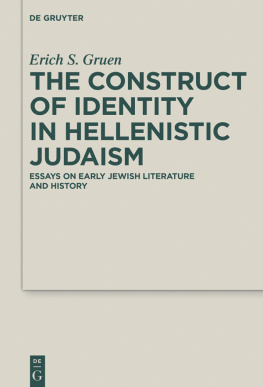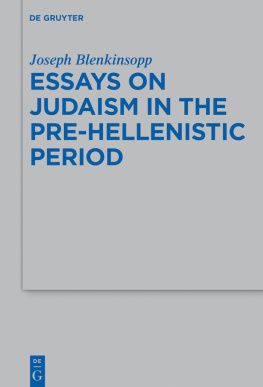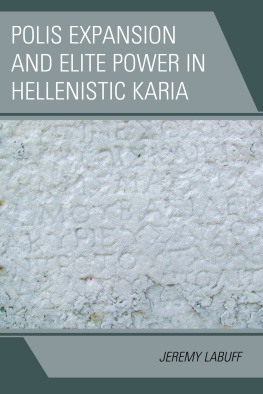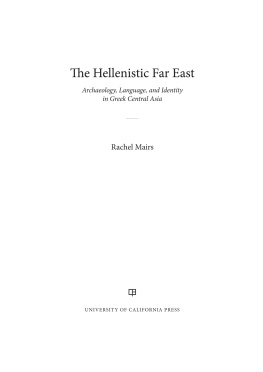Erich S. Gruen - Constructs of Identity in Hellenistic Judaism
Here you can read online Erich S. Gruen - Constructs of Identity in Hellenistic Judaism full text of the book (entire story) in english for free. Download pdf and epub, get meaning, cover and reviews about this ebook. year: 2016, publisher: Walter de Gruyter, genre: Romance novel. Description of the work, (preface) as well as reviews are available. Best literature library LitArk.com created for fans of good reading and offers a wide selection of genres:
Romance novel
Science fiction
Adventure
Detective
Science
History
Home and family
Prose
Art
Politics
Computer
Non-fiction
Religion
Business
Children
Humor
Choose a favorite category and find really read worthwhile books. Enjoy immersion in the world of imagination, feel the emotions of the characters or learn something new for yourself, make an fascinating discovery.
- Book:Constructs of Identity in Hellenistic Judaism
- Author:
- Publisher:Walter de Gruyter
- Genre:
- Year:2016
- Rating:4 / 5
- Favourites:Add to favourites
- Your mark:
- 80
- 1
- 2
- 3
- 4
- 5
Constructs of Identity in Hellenistic Judaism: summary, description and annotation
We offer to read an annotation, description, summary or preface (depends on what the author of the book "Constructs of Identity in Hellenistic Judaism" wrote himself). If you haven't found the necessary information about the book — write in the comments, we will try to find it.
Constructs of Identity in Hellenistic Judaism — read online for free the complete book (whole text) full work
Below is the text of the book, divided by pages. System saving the place of the last page read, allows you to conveniently read the book "Constructs of Identity in Hellenistic Judaism" online for free, without having to search again every time where you left off. Put a bookmark, and you can go to the page where you finished reading at any time.
Font size:
Interval:
Bookmark:

Erich S. Gruen
Constructs of Identity in Hellenistic Judaism
Deuterocanonical and Cognate Literature Studies

Edited by
Friedrich V. Reiterer, Beate Ego and Tobias Nicklas
Volume 29

ISBN 978-3-11-037302-8
e-ISBN (PDF) 978-3-11-037555-8
e-ISBN (EPUB) 978-3-11-038719-3
ISSN 1865-1666
Library of Congress Cataloging-in-Publication Data
A CIP catalog record for this book has been applied for at the Library of Congress.
Bibliographic information published by the Deutsche Nationalbibliothek
The Deutsche Nationalbibliothek lists this publication in the Deutsche Nationalbibliografie; detailed bibliographic data are available on the Internet at http://dnb.dnb.de.
2016 Walter de Gruyter GmbH, Berlin/Boston
www.degruyter.com
Constructs of Identity in Hellenistic Judaism :
Essays in Early Jewish Literature and History
Erich S. Gruen
Volumes of essays by retired (or nearly retired) scholars have proliferated in recent decades. How does one account for this phenomenonlet alone justify it? Publication of a scholars kleine Schriften is, of course, not a new institution. But most of those that appeared in the past served as memorials to those who had already departed from the scene, a final legacy to the epigoni . The assemblage of pieces by authors still alive and kicking needs fuller explanation. A matter of ego? That inevitably plays a part, and it would be disingenuous to deny it. But a more respectable motivation can also be put forward. The multiplication of conference volumes, Festschriften, companions, handbooks, anthologies, and edited selections around a theme has become increasingly conspicuous, if not predominant. Many of the articles in this collection first appeared in such publications. Works of that sort are by no means an unworthy enterprise, especially as some of them reach out at a high level to a readership beyond the specialist. But they have a serious drawback. The volumes generally receive little promotion by publishers, and numerous individual contributions contained in them are overlooked or unknown by the large majority of scholars in the field. Unless one knows in advance where to look, the pieces are unlikely to be stumbled upon by accident. The present volume, by gathering scattered essays between two covers, will give them a wider circulation, make for more convenient consultation, and bring them to the attention of those who are otherwise unaware of them. Whether they merit the attention may be left for others to decide.
More than thirty years ago I was approached by a publisher who wished to produce a selection of my published essays as a book. That was a most flattering suggestion, and I considered it seriously. In the endand with some reluctance I declined that generous invitation. I felt at the time that my corpus of essays lacked both the quantity and the distinction to merit publication as a self-standing book. To approve such a project might seem (indeed would have been) an act of arrogance. Now, many years later, one can at least make a case for the quantity. And the added years could make the arrogance a little more forgivable.
The passage of time has had another significant consequence. An assemblage of my pieces in the early 1980s would have been heavily weighted toward Roman history, especially Roman political history. That is the area in which I cut my scholarly teeth, and I have never regretted it. But I have long since moved in other directions, for good or ill. I drifted into Hellenistic history and became heavily engaged with it, much to my pleasure and gratification. And the focus soon turned away from political and diplomatic history to cultural history, more particularly the interaction of Hellenic culture and Roman society that occupied much of my work for a decade and more. The exploration of means and media whereby Romans appropriated Hellenism to reformulate their own cultural identity led me in a natural progression (natural, at least, in retrospect) to investigation of a comparable subject, i.e. the relationship of Hellenism and Jewish identity. I regarded the shift in topic as an organic intellectual development even though some of my colleagues and friends, especially those in Israel, interpreted the new direction as a return to my Jewish roots. Whatever the alleged unconscious drive, however, engagement with Jewish history and literature in the Greco-Roman period has held sway in my research for the last two decades.
That focus also helped to prompt this publication. In reconsidering the proposition made three decades ago, I realized that there were now more than twenty articles that would come under the heading of Second Temple Judaism alone, thus providing a reasonable body of work on various aspects of the subject. Moreover, the collection could have a coherence often lacking in assemblages of ones favorite little gems.
The twenty-three papers collected here fall into five separate but interrelated categories. The volume opens with two contributions under the heading of general reflections. The first is, in fact, the earliest piece, delivered originally as the presidential address to the American Philological Society in 1992. It served as a form of clarion call to Classicists to expand their horizons and look to the interconnections between Greek and Roman societies and the cultures of the Near East. This was hardly a new idea, but it stressed the means whereby cultural identities were defined by exploiting and appropriating the myths, legends, and tales of other societies, thereby enriching ones own. As prime illustrations, I called attention to Jewish stories that linked their traditions to those of the Hellenic world and thus enhanced their own self-esteem. That venture represented my initial steps into the realm of Jewish studies, and the theme itself augured much of my subsequent work in that field. Less than a decade later, I was asked by the eminent Jewish historian David Biale (who was also a good friend) to contribute a chapter on Hellenistic Judaism for his monumental Cultures of the Jews (2002). This afforded a welcome opportunity to provide an extended overview of the subject, but one that did not restrict itself to delivering a mainstream consensus. The medium served as a vehicle for presenting a number of my ideas on Jewish encounters with Hellenism, investigating a range of literary genres that illustrated Jewish commandeering of Greek forms to convey their own expressions of identity, and analyzing the complex relationship between an integrated existence in the diaspora and allegiance to the homeland. I remain deeply grateful to David Biale for extending to a relative newcomer to the field the opportunity to expose his ideas to a wider (but occasionally unforgiving) audience.
. Each of them illustrates facets of the construction of Jewish identity in the circumstances of Greco-Roman society. One offers a close analysis of the fascinating legend (a Jewish composition) that has Jews and Spartans both derive from the seed of Abraham. A second recounts the diverse reconstructions in which Greek writers depicted Jews as philosophers and Jews in turn conceived Greek philosophy as drawn from Mosaic teachings. Another calls attention to the instances of intermarriage and constructed kinship relations between Jews and non-Jews that underscored commonality rather than separateness. Still another examines the literary and epigraphic evidence that shows Jewish adaptation of pagan practices and the permeability of boundaries between Jewish and non-Jewish societies. And one other explores a range of fictive creations stressing the dynamic interchange between the cultures and undermining the simplistic dichotomy of Hellenism and Judaism.
Font size:
Interval:
Bookmark:
Similar books «Constructs of Identity in Hellenistic Judaism»
Look at similar books to Constructs of Identity in Hellenistic Judaism. We have selected literature similar in name and meaning in the hope of providing readers with more options to find new, interesting, not yet read works.
Discussion, reviews of the book Constructs of Identity in Hellenistic Judaism and just readers' own opinions. Leave your comments, write what you think about the work, its meaning or the main characters. Specify what exactly you liked and what you didn't like, and why you think so.











